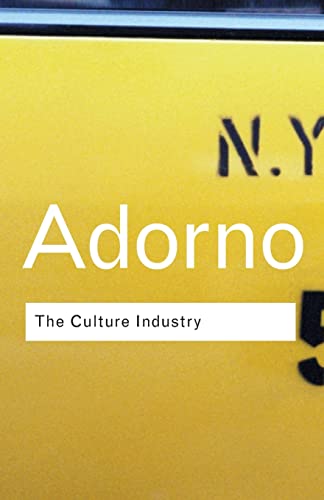The Culture Industry
Selected Essays on Mass Culture (Routledge Classics)
Theodor W. Adorno
BOOK REVIEW

In the sprawling landscape of modern thought, The Culture Industry: Selected Essays on Mass Culture stands as a clarion call to all who dare to peel back the layers of our society's fabricated pleasures. Theodor W. Adorno, a towering figure in 20th-century philosophy, invites you into a world where art and commerce collide, twisting the genuine expressions of human experience into mere commodities. This collection of essays serves not only as a critique but as a transformative shock-an opportunity to dismantle the pervasive misunderstandings that bind us to our cultural consumption.
Every page bursts forth with Adorno's piercing analyses, cloaked in a beautifully complex prose that demands your full attention. He explores the insidious ways mass culture shapes our thoughts and identities, questioning the very foundations of art and its role in a society obsessed with entertainment. His voice, once revolutionary, now echoes through the halls of contemporary debate. The implications of his arguments resonate profoundly today, as social media, binge-watching, and soulless consumerism vie for our attention and loyalty. What does it mean for individuality when every artistic endeavor is wrapped in the garb of profitability?
Delving into Adorno is not merely an intellectual exercise; it's a journey into the heart of what it means to be human in a world that often sees us as mere consumers. Critics and fans alike often point out that his essays can feel dense, but this perceived heaviness is a testament to the weight of the issues he addresses. Many readers are struck by the clarity with which he exposes the deceits of the culture industry-how radio, film, and television morph authentic artistic expression into palatable pabulum for the masses. Adorno does not shy away from the uncomfortable truths; instead, he thrusts them into the limelight, compelling us to confront our complicity in this cultural machinery.
Perhaps one of the most electrifying elements of this work is Adorno's ability to interlace historical context with sharp cultural critiques. He grapples with the legacy of the Enlightenment and how the very ideals of freedom and autonomy have been commodified. His arguments remind you that the pursuit of pleasure, often seen as innocent folly, can indeed mask the deeper manipulations at play. He beckons you to not only observe but to reflect: Are you a passive recipient of culture, or are you an active participant seeking to break free from these chains?
Adorno's influence is omnipresent, crossing the paths of thinkers like Herbert Marcuse and even modern cultural critics who grapple with the implications of his work in today's hyper-connected society. In his essays, Adorno doesn't just nurture a critique; he instills a radical hope-an invitation to resist the numbing effects of conformity. This work has cultivated a new generation of artists and philosophers who echo his sentiments, advocating for authenticity amid the chaos of pop culture.
Readers' responses vary widely; some hail his work as groundbreaking, while others wrestle with the complexity that can feel overwhelming. For the uninitiated, the depth of thought can be jarring, inviting polarized opinions. The discourse surrounding Adorno often oscillates between admiration and frustration-an acknowledgment that grappling with his ideas is not easy but undeniably essential. How many of us have sat in front of our screens, mindlessly consuming content? How many have felt that familiar pang of guilt afterwards?
These questions linger, often prompting deeper consideration of our own media diets. As you traverse the landscapes of his thoughts, you might find your own views challenged, perhaps even ignited into a small flame of rebellion against the status quo. His essays function not only as critiques but as passionate clarion calls to recognize the potential perils of a straightjacketed culture.
In a world bombarded by superficial distractions, The Culture Industry dares you to dive deeper. It serves as a reminder that art is not just a commodity; it is a vessel for truth, an avenue for social change, and a reflection of our very souls. Every phrase resonates with a sense of urgency, an insistence that you awaken to the reality around you; the landscape of mass culture is not merely an external phenomenon but an internal dialogue with profound implications for who we are and who we can become.
So, as you embark on your exploration of The Culture Industry, surrender to its challenging narrative, absorb its rich texture, and let Adorno's voice stir something within you.✊️ In a world fattened by mediocrity, let his insights be a radical invitation to reclaim your consciousness and embrace the true essence of artistic expression.
📖 The Culture Industry: Selected Essays on Mass Culture (Routledge Classics)
✍ by Theodor W. Adorno
🧾 224 pages
1991
#culture #industry #selected #essays #mass #culture #routledge #classics #theodor #adorno #TheodorWAdorno